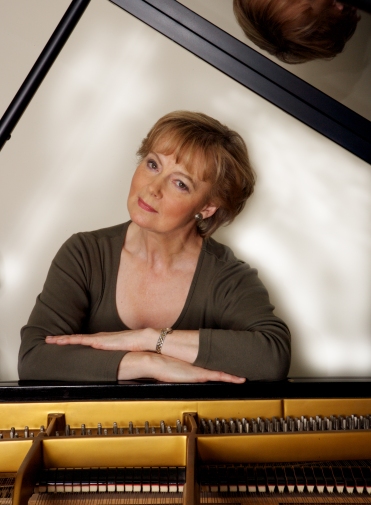
Who or what inspired you to take up the piano, and make it your career?
I don’t remember not playing the piano! But as a career – the London-based Swiss pianist, Albert Ferber, with whom I was studying, encouraged me to make my debut at Wigmore Hall in 1974.
Who or what were the most important influences on your musical life and career?
All my teachers in different ways; musical members of the family; friends and colleagues who believed in me. The composer William L Reed was a marvellous mentor and facilitator. Perhaps most important of all, a passion for the music I had found and a powerful desire to communicate it.
What have been the greatest challenges of your career so far?
To focus on priorities.
Which performance/recordings are you most proud of?
The ones where there has been that special communication with listeners – whether in the concert hall or in feed-back from far-flung corners of the world. I do not wish to be solely defined by the many Grainger ones, but they have presented much repertoire that is new, fresh, entrancing, life-enhancing – hard work, but what a joy!
Which particular works do you think you play best?
The particular ones for which I feel a gut instinct, whether by Bach, Beethoven, Schumann, Brahms, Chopin, Ravel, Debussy, Rachmaninov …. the list goes on.
How do you make your repertoire choices from season to season?
That is dictated by the projects I am undertaking.
Do you have a favourite concert venue to perform in and why?
I have enjoyed different venues for different reasons – the Melbourne Recital Centre is lovely, but so too is London’s Kings Place for its vibrant sense of enterprise (and very fine hall), and St John’s, Smith Square for its beauty. I have often relished the pin-point acoustics of Wigmore Hall, and the warm atmosphere of the Purcell Room. It was a thrill to play on the stage at Covent Garden for a gala Australia Day concert and at the Royal Festival Hall in Grainger’s ‘The Warriors’. By contrast, a good piano in a large music room can be perfect for a recital where one introduces the music.
Favourite pieces to perform? Listen to?
Most recently Bach transcriptions and originals for a Bach CD on LIR Classics. And see above……
Who are your favourite musicians?
To hear: I so loved the Pollini Beethoven cycle, and in different sonatas, Brendel (the last three) and, unexpectedly, Barenboim in some of the early ones. Of course, that force of nature, Argerich! On disc – Dinu Lipatti, Solomon and Richter.
For many years I played two piano programmes with my friend and colleague, John Lavender. We gradually developed a way of creating one texture from two pianos. We recorded much new Grainger repertoire on three discs and John also made some splendid two piano versions of such works as Tchaikovsky’s ‘Romeo and Juliet’ overture as part of an all-Russian programme.
I have been lucky to work with so many fine artists – in earlier days, the mezzo Muriel Smith, more recently, certain outstanding singers – Stephen Varcoe, Martyn Hill, James Gilchrist and Della Jones, in the Chandos Grainger recordings and in concert. Wayne Marshall was a memorable colleague both as pianist and conductor. It has been a great pleasure to work with the cellist, Rohan de Saram, who has recently returned to the standard repertoire along with his extraordinary abilities and achievements in the field of contemporary music. Earlier women pianists who inspired me in concert included
Lili Kraus, Alicia de Larrocha and Rosalind Tureck. Also Hephizibah Menuhin, whom I knew and admired as a friend.
These are but a few names amongst many others…
What is your most memorable concert experience?
Too many memorable experiences to choose one – but playing in 1980 in the Beijing Conservatoire and to a radio audience they told me averaged 50 million – was certainly the largest audience ever!
What do you consider to be the most important ideas and concepts to impart to aspiring musicians?
Be yourself. Find your unique path. Work hard. Know that beyond failure there is always the next step. Cherish your friends and the wonderful opportunities we have to share our music.
What are you working on at the moment?
A concert at King’s Place, London, to mark 40 years since my London debut.
It will be a programme filled with melody and shared with some good friends, the Fitzwilliam String Quartet and a group of gifted young professionals, as we shall be premiering a piano concerto movement written by Grainger when he was just 13 years old.
I’ll start with mighty Bach arr. Liszt and progress through Grieg (lovely Grieg) by way of Grainger to the Dvorak Piano Quintet Op 81 – what an utterly gorgeous work.
What is your present state of mind?
Expectant.
Penelope Thwaites’ 40th Anniversary Concert takes place at London’s King’s Place Hall One on Wednesday 8th October. She is joined by the Fitzwilliam Quartet and outstanding young professional artists in a programme of music by Bach arr. Liszt, Grieg, Grainger and Dvorak. Further details here
London-based pianist and composer Penelope Thwaites has performed and broadcast in over thirty countries on five continents. Since her Wigmore Hall debut in 1974, she has appeared regularly as recitalist in major concert halls, and in a wide repertoire she has built a reputation as an intensely communicative artist. As concerto soloist she has appeared with the Philharmonia, the London Philharmonic Orchestra, City of London Sinfonia and the BBC Concert Orchestra, and with leading orchestras in Australia, Europe and America.

 Who or what inspired you to take up your chosen instrument and make music your career?
Who or what inspired you to take up your chosen instrument and make music your career?





